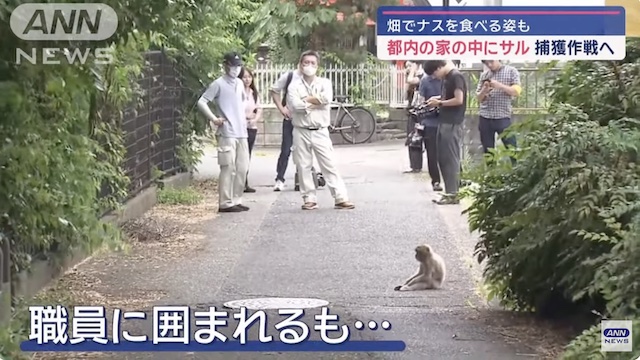TOKYO, Jun 26 (News On Japan) - A roaming monkey sparked a wild goose chase on Wednesday in a residential area of Tokyo, running amok in local vegetable patches while evading capture by police and residents.

Upon receiving the initial report, cameras captured footage of the monkey grooming itself on a street corner. The incident occurred in a residential area approximately a 20-minute walk from Tachikawa Station. On the morning of June 26, there was a report of a monkey sighting in Tachikawa City, Tokyo.
Nearby residents gathered, showing curiosity rather than alarm.
“It’s cute, very cute,” commented one resident.
“I’ve never seen one before,” another resident remarked.
Panku Machida, chairman of the NPO Center for Biological Behavior and Evolution, observed, “It looks like an adult female, about 50 centimeters in size, which is fully grown.”
The monkey entered a residential property, prompting one resident to call the emergency services.
“There’s a monkey in my yard,” the caller reported.
Residents took out nets and attempted to capture the monkey, often outpacing the police. However, the monkey skillfully evaded capture, also causing damage to crops.
The monkey continued to roam the residential area of Tachikawa City, climbing onto roofs to evade capture. Police officers increased their numbers and monitored the situation, while the monkey freely roamed, sometimes resting and searching for food.
The monkey even navigated through barbed wire with ease before returning to the streets, where city officials surrounded it.
The monkey also damaged agricultural produce. As of 4 p.m., city officials were still monitoring the monkey closely.
A Tachikawa City official warned, “Monkeys can get close to people, which is dangerous due to their claws. It's important not to approach them or make eye contact.”
Speculation about the monkey’s origin pointed to the Tama area.
Panku Machida commented, “It's not surprising for a monkey to travel this distance. It could have come even further into the city. The monkey likely ventured close to residential areas in search of food due to hunger. Feeding wild animals can make them aggressive, so it’s crucial not to feed them.”
Source: ANN















